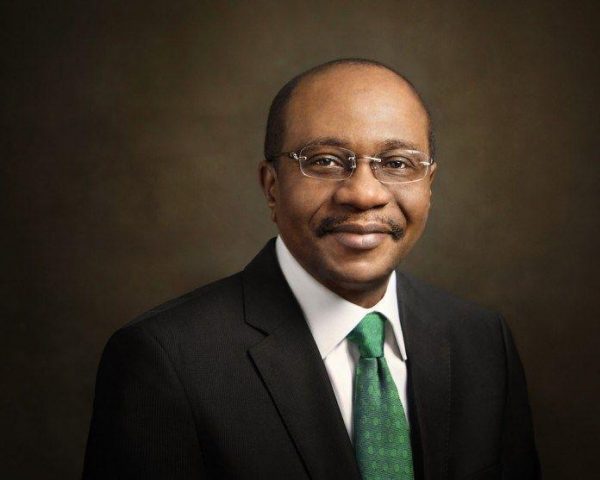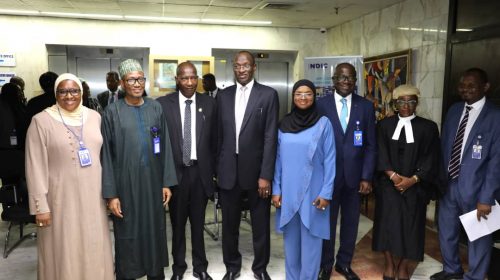Gov. Godwin Emefiele: A Brief to the Diplomatic Community on Recent Monetary Policy Decisions of the CBN

A Brief by
Governor Godwin I. Emefiele, CON
to Diplomatic and Consular Missions
on the Recent Monetary Policy Decisions of the Central Bank of Nigeria
the Rotunda Hall
Ministry of Foreign Affairs
Federal Republic of Nigeria
Abuja
14 February 2023
Gov. Godwin Emefiele, CON
A Brief to the Diplomatic Community on Recent Monetary Policy Decisions of the CBN
The Rotunda Hall, Ministry of Foreign Affairs, Abuja
14 February 2023
_______________________________
[Protocol]
Opening Pleasantries — Good morning your Excellencies, distinguished ladies and gentlemen. It is indeed a great pleasure and a privilege to make brief remarks on the recent policy of the Central Bank of Nigeria in view of prevailing global and domestic developments that affect our economy. I most sincerely thank the organisers of this event for the opportunity given to me to clarify the contextual realities that shaped our decisions and to illuminate our expectations for the future. I will equally use the opportunity of this forum, to acquaint you of the Naira redesign policy of the Central Bank of Nigeria.
Context
- Over the last few years, the global economy has undergone a series of path altering shocks including the devastating effects of the Covid-19 pandemic and, more recently, the profound dislocations from Russian-Ukrainian war. Together, these and other disruptive global developments have influenced monetary policy decisions of the central banks in many countries as they struggle to balance the objective price stability with the desire for long-run output stabilization.
Global Conditions
- During the last Monetary Policy Meeting of the Central Bank of Nigeria, we noted that global macroeconomic conditions remained severely distressed as the year-long war in Ukraine persists with no end in sight. Prevailing risks to short-term prospects are escalating, reflecting the adverse effects of the conflict on output and inflation. Global outlook is highly uncertain, and as fragility broaden across countries, recovery seem to have stalled and growth momentum slowed. Although inflation is beginning to moderate in some key economies, profound energy supply bottlenecks had steepened prices to levels that drastically debilitate business confidence and erode households’ purchasing power. Massive layoffs in the US, protracted war in Europe that exacerbated commodity and energy supply shortages, and chronic slowdown in China, jointly portend global recession. Global fragility is compounded by widespread monetary tightening to combat inflation. Accordingly, the IMF projections cap global growth at 3.2 percent for 2022 and 2.7 percent for 2023, reflecting lower estimates for both advanced economies and EMDEs.
Domestic Developments
- Amidst the dampening effect from global conditions, short-term outlook of the Nigerian economy remained stable and tilts to the upside. The steady pick-up of economic activities observed throughout 2022 is expected to continue in 2023, keeping recovery on-track. This follows programmed measures to mitigate external shocks, curtail domestic constraints, strengthen economic fundamentals, elicit structural rebalancing, and boost long-run prosperity. Regardless of existing fragilities and relentless exogenous threats, the Nigerian economy has so far largely withstood powerful global pressures.
- With a 2.25 percent year-on-year growth in 2022q3 vis-à-vis 3.54 percent in 2022q2, GDP remained on track and could consolidate in 2023. This followed the sustained rebound of business activities, increased labour mobilisation, and expanding productive capacity especially in the non-oil sector. At 4.27 percent, growth in the non-oil sector remained robust in 2022q3 reflecting the faster 7.01 percent expansion in services and 1.34 percent in agriculture. However, contraction of oil GDP worsened to -22.67 percent due to acute impairments in the sector. In-house analysis of overall GDP projects 2023 growth at 3.01 percent vis-à-vis 2.88 percent estimated for 2022 and 3.40 percent recorded in 2021. This observed performance was buoyed by continued CBN’s interventions to support critical economic activities, resolve the long-standing structural constraints, and bolster domestic productivity with favourable effects on market prices.
- Though year-on-year inflation rate, at 21.34 percent in December 2022, remained above medium-term average and the Bank’s tolerance band, it eased by 0.13 percentage points from the November outcome. This marginal reduction reflected the 0.38 percentage points drop in food inflation to 23.75 percent as against the 0.25 percentage points rise in core inflation to 18.49 percent. This year-on-year disinflation is feeble, especially as seasonality factors elevated month-on-month inflation by 0.32 percentage points to 1.71 percent in December. The MPC noted that headline inflation, at over 21 percent unacceptably remained at a growth-inhibiting level and must be resolutely tackled. Generally, global forces, infrastructure and energy drawbacks, security challenges, electioneering cycle, plus logistic and distribution inadequacies are propping domestic inflation. Some of these factors are being tackled through our developmental initiatives. Near-term outlook suggests noticeable disinflation in 2023 if adequate policy measures are timeously undertaken.
- Observed inflation levels also reflected the liquidity conditions in December 2022. At 11.61 percent, the 0.85 percentage points (month-on-month) fall in weighted average OBB rate implied surfeit of financial market liquidity. Correspondingly, money stock (M3) quickened by 16.52 percent beyond the 15.21 percent programmed target and 13.92 percent in November 2022. This was attributable to the 36.46 percent growth of net domestic assets following the 20.17 percent rise in banking system credits to the private sector. With a N5.14 trillion year-on-year rise in December 2022 to N29.72 trillion, gross credit by the banking industry maintained its upward trajectory since 2019 due largely to CBN’s LDR directive, increased industry funding base, and business competition. Satisfyingly, key performance indicators showed wide-ranging stability of the banking system with the NPL ratio (4.21 percent), liquidity ratio (44.12 percent) and CAR (13.76 percent), all outdoing their prudential limits.
Macroeconomic Outlook
- As at the time of the last MPC meeting, we noted the increasing likelihood of a global recession in 2023. The broad outlook for the recovery of both the global and domestic economies remain uncertain with the path to full recovery clouded by significant downside risks. The key risks remain the lingering headwinds from the Russian-Ukraine war, heightened inflationary pressure across several economies and sharp slowdown of economic activities in China with the resurgence of COVID-19 pandemic across its major cities.
- Available data and forecasts for key macroeconomic indicators for Nigeria suggest that the economy will continue to grow through 2023, but at a subdued pace. The continued high level of insecurity; perennial scarcity of Premium Motor Spirit (PMS) and high cost of other energy sources; increased spending towards the 2023 general elections; rising cost of debt servicing; and deteriorating fiscal balances, remain the key sources of shocks to the Nigerian economy. Accordingly, the economy is forecast to grow in 2023 by 3.01 per cent by the CBN estimate
Policy Consideration
- The MPC acknowledged that although year-on-year inflation had started to moderate, the pace of disinflation, at a marginal 13 basis points, was inadequate and needs be redoubled. Inflation at over 21 percent was still hugely damaging to the economy and growth-retarding. As such, only further monetary tightening was considered appropriate, because a loosening or hold decision under a double-digit inflationary condition will be tantamount to an immediate reversal of the downward trend in inflation. We also believe that the current naira redesign and cash withdrawal limit policies, by moderating currency outside the banking system could further engender disinflation.
Decision of the Last MPC Meeting
- Overall, the MPC felt that a tightening stance would signal confidence in the effectiveness of its Monetary Policy direction to rein in inflation, improve financial system stability, and moderate exchange rate. Accordingly, the MPC decided to:
- raise the MPR by 100 basis points to 17.5 per cent;
- retain the asymmetric corridor of +100/-700 basis points around the MPR;
- retain the CRR at 32.5 per cent; and
- retain the Liquidity Ratio at 30 per cent.
The Naira Redesign Policy
- Your Excellencies, distinguished ladies and gentlemen. As you may recall, the Central Bank of Nigeria received the approval of President Muhammadu Buhari, on 26 October 2022, to redesign the N200, N500, and N1000 Nigerian banknotes. By the approval, the redesigned banknotes were to circulate concurrently with the old notes, up to 31 January 2023 after which the old notes were to lose their legal tender status. However, given the need to improve the level of circulation of the new notes, the President magnanimously extended the deadline by another 10 days to 10 February 2023 for old notes to circulate as legal tender.
- Currency management is a key function of the Central Bank of Nigeria, as enshrined in Section 2(b) of the CBN Act 2007. Indeed, the integrity of a local legal tender, the efficiency of its supply, as well as its efficacy in the conduct of monetary policy are some of the hallmarks of a great Central Bank. Due to persistent challenges that are inundating currency management in Nigeria and undermining our sovereign integrity, the CBN conducted extensive inhouse analysis and consultation which suggested the need for a policy to redesign some Nigerian banknotes.
- The currency redesign policy is also consistent with Sections 20(3), which gives the Bank the power to recall extant banknotes or coins following the approval of the President and a reasonable notice period. Our actions, thus, falls squarely within the bounds of the powers provided by the Act, as we sought and got Presidential approval and gave 100 days’ notice in the first instance, which was later extended by another 10 days. This was to allow Nigerians to deposit their old notes at the CBN and gradually redeem the new notes.
- As I have reiterated many times before today, the general practice across the globe is for central banks to redesign national currency within 5-8 years. From the on-set of this currency redesign program, we made it clear that for over 19 years, the CBN has not been able to undertake this important currency and liquidity management function that has important ramification for the effectiveness of monetary policy.
Why the Naira Redesign Policy?
- Our principal aim, with the currency redesign initiative, is to make our Monetary Policy decisions more efficacious and like you can see; we have started to see inflation trending downwards and exchange rates relatively stable. Secondly, we aim to increase financial inclusion in the country by reducing the number of the unbanked population. Thirdly, our aim is to support the efforts of our security agencies in combating banditry and ransom-taking in Nigeria through this program and we can see that the Military are making good progress in this important task.
- Available data at the Central Bank of Nigeria showed that in 2015, currency in circulation was only N1.4trillion. As of October 2022, currency in circulation had risen to N3.23 trillion; out of which only N500 billion was within the Banking System and N2.7 trillion held in people’s homes. These indicate that, so far, we have held excessive amounts of currencies in our hands rather than in banks or in cashless platforms. Ordinarily, when CBN releases currency into circulation, it is meant to be used and after effluxion of time, it returns to the CBN thereby keeping the volume of currency in circulation under the firm control of the CBN. It should also be noted that the Notes in private homes and outside the banking system are not available for economic activities and thus may affect the economy attaining its potential growth.
- Our in-house analysis of the pre-policy currency adequacy indicated not only that currency outside banks was excessive but also that quantum of currency in circulation was suboptimal. Exhaustive simulation and model-based analysis founded on the drive to achieve a 20% – 40% cashless economy indicate that the optimal value of currency in circulation for the Nigerian economy is only N700 billion. This is just a fraction of the hitherto currency supplied to the economy and could explain, in part, the excess demand we have witnessed in foreign exchange market and to some extent goods market.
Expected Benefits of The Policy
- Generally, currency redesign policies are designed by countries to strengthen the performance of key macroeconomic parameters and equally combat social improprieties. Chiefly, it is expected to reduce the amount of cash in underground or illicit economy, truncate the activities of racketeers, and obliterate rent-seeking businesses in the black market. By reducing currency outside banks, it will shrink money stock and accordingly lower the long-run path of inflation. The ensuing deflationary pressure could elicit interest rate cuts that will in the short- to medium-term boost economic activities, spur aggregate demand, and enhance output growth.
- The macroeconomic impacts of currency redesign are multidimensional and could seem uncertain especially at this early stage when its inconvenience is widespread. By spurring more people to use bank accounts, this policy will further increase bank account ownership and increase the use of accounts by enhancing people’s saving behavior. It could encourage some hitherto informal business operators to formalize the pattern of transactions and adopt more formal settlement channels. As experiences from other jurisdictions have shown, effective currency redesign can support regulatory reform, increased legislative reach and coordinated fiscal and structural policies. Aside the general benefits of a currency redesign, we expect a number of economic gains for Nigeria, including:
- Reduction in Money Supply: Effectively implemented currency redesign causes a fall in money supply. This will lead to reduction of value of money in circulation and a deceleration of the velocity of money in the economy leading to less pressures on domestic prices. As we mop up cash in circulation, money supply could decline, under certain assumptions. In addition, the speed at which money changes hands could reduce. Basic economic tenets under the quantity theory of money suggests that the fall in monetary velocity could retard price growth and taper nominal money supply.
- Lowering Inflation: The policy is typically expected to cause deflation in the market as less cash holding reduces currency outside banks and retards money circulation. The accompanying decline in money supply will thus slow pace of inflation. As you can see, we have stated to witness inflation trending downwards, following general price stability in almost all genre of markets including for goods and financial products. For instance, analysis shows that an effective implementation of the policy could by itself scrape four percentage points off the current level of inflations as it steadily slows inflation rate to about 18.0 percent by mid-2023.
- This is quite achievable, as data from our market sources indicate that the prices of grains and key staples, around Suleja and Lambata markets for instance, have generally been on the downward trend since the beginning of the policy. The price for soya beans has dropped from N30,000 to N22,000. Maize from N18,000 to N16,000. The price of a bull fell from N400,000 to N330,000 and ram from N75,000 to N50,000.
- Exchange Rate Stability: Prior to the announcement of the policy, the huge cash haul outside the banking system had exerted significant pressures on the exchange rate at all windows, but more so at the parallel market as it engendered asset substitution by speculators, and rent-seekers. While the policy was initially estimated to lead to more speculations due to panic moves as most people try to understand the policy action, it is expected to reduce speculation in the medium- to long-run. Today, the limited circulation of the new Naira notes has forced the hands of speculators and we are beginning to witness some stability. The initial pressure is projected to further moderate as the implementation of the policy takes-off and a wider understanding pervades the system.
Reason for Queue and Pressure
- Before concluding this brief, let me state, and sadly too, that we acknowledge the widespread inconveniences due to this policy. We have observed pervasive incidences of hoarding and predatory activities of some vendors and unscrupulous Nigerians. The principal causes of the hardship to the citizens following the redesign policy include:
- Hoarding – We have noticed that some members of the public are hoarding the new notes thereby restricting their flow through the economy. Cash kept at home will not circulate but may fuel a perception of scarcity which leads to higher demand for the currency, signalling to those who don’t have an urgent or immediate need to store cash.
- Tension and Elevated Agitations – There is tremendous tension and elevated agitation by our leaders who should be calming frayed nerves by the citizens. We believe that a large proportion of these agitations are staged and sponsored propagandas or an exaggeration of the reality. No doubt that there are pockets of pressures in some areas, the CBN is working hard to shift resources to those areas in order to ease the tension. The situation is substantially calming down since the commencement of the Over-the-Counter payments to compliment ATM disbursements and the use of super agents.
- Panic Queues – The CBN has also noticed long queues at some bank ATMs and banking halls. Whilst some of these withdrawal requests are genuine, some are simply the reprehensible activities of miscreants who do not have the genuine intention of making a withdrawal but are seeking quick-earnings by queuing up just to sell their spaces to make money.
- Panic Mop-up of Notes by Politicians – The CBN has also noticed that some politicians are buying the new notes and storing them for political purposes.
- Incidences of Economic Opportunism – We have also noticed that some Nigerians are capitalising on the transition to charge exorbitant fees or demand cash payment on the false pretext that PoSs don’t work, especially at petrol stations. These selfish actions for personal monetary gain are creating hardship for Nigerians and may come at the expense of fellow citizens lives and livelihood.
Concluding Remarks
- The CBN reiterates the availability of an appropriate amount of currency (redesigned N200, N500, and N1,000 denominations and current N100, N50, N20, N10 and N5 denominations) to support economic activities. The Bank is collaborating with the entire financial ecosystem DMBs, OFIs, MMOs, Super Agents, MFBs Payment System Providers and EFCC, ICPC and other law enforcement to ensure that Nigerians have a variety of options for financial transactions either through electronic channels or in exceptional circumstances, cash.
- We are mindful of the challenges some citizens have faced and are addressing them. There have been reports of occasional failures in e-channel platforms. Our monitoring suggests that whilst there has been an expected surge in electronic transactions, these have not risen to unprecedented levels and the payment system is well equipped to handle even higher transaction volumes. Whilst transaction failures are bound to occasionally occur, the public is encouraged to have full confidence in Nigeria’s globally recognized payment system infrastructure. Banks have also been instructed to ensure 24/7 service availability and promptly address any customer refunds arising from such service failures.
- The CBN remains committed to ensuring a seamless, inclusive and equitable implementation of this exercise for the overall benefit of the people, financial system and Nigerian economy as a whole.
- I thank you for your attention.
Godwin I. Emefiele, Con
Governor, Central Bank of Nigeria
14 February 2023






Leave a Reply